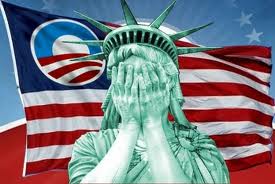Leader of the Free World Wimps Out
Obama’s little lecture to the naughty boys did not work. His demand for tolerance was rejected the very next day by the democratically elected president of the Arab Spring’s largest nation and its most prominent success story, by the representatives of what Mr. Obama told the UN last year was a “remarkable year” for democratic progress.
by Donald Devine
You are sitting at your official position at the United Nations and you hear  President Barack Obama lecture you: “Today, we must declare that this violence and intolerance has no place among our United Nations.”
President Barack Obama lecture you: “Today, we must declare that this violence and intolerance has no place among our United Nations.”
You are Kim Jong-il of North Korea, or Teodoro Nguema Obiang Mbasogo of Guinea, or Choummaly Sayasone of Laos, or President for Life Saparmurat Niyazov of Turkmenistan, or Truong Tan Sang of Vietnam or the thug leading one of the other 43 nations ranked by Freedom House as oppressive – what would you be thinking?
President Obama continued “it is the obligation of all leaders, in all countries to speak out forcefully against violence and extremism. True democracy – real freedom – is hard work. Those in power have to resist the temptation to crackdown on dissidents,” to “rally the people around perceived enemies at home and abroad, rather than focusing on the painstaking work of reform.” What do you think, Trong? What about the other leaders of the majority of UN countries who crackdown on opponents every day and do not have the slightest interest in reform?
 Of course, in the wake of the barbaric killing of U.S. Ambassador J. Christopher Stevens in Libya and the related demonstrations against an amateur YouTube video made in the U.S. that insulted the prophet Mohammad, the president was mainly concerned about the Arab world and the Middle East. What might even ally Saudi Arabia’s Abdalla bin Abd al-Aziz Al Saud think about tolerance for Christians to say nothing about Shiite Muslims, both of whom he oppresses at home?
Of course, in the wake of the barbaric killing of U.S. Ambassador J. Christopher Stevens in Libya and the related demonstrations against an amateur YouTube video made in the U.S. that insulted the prophet Mohammad, the president was mainly concerned about the Arab world and the Middle East. What might even ally Saudi Arabia’s Abdalla bin Abd al-Aziz Al Saud think about tolerance for Christians to say nothing about Shiite Muslims, both of whom he oppresses at home?
While most of the UN leaders were too shrewd to respond, although not mentioning the U.S. by name, Iranian President Mahmoud Ahmadinejad did harangue “big power” domination of the UN Security Council against the interests of the smaller and poorer nations in the General Assembly, and criticized the Security Council and “uncivilized Zionists” for unilaterally imposing instability and wars. What was unexpected was that the next day the newly elected Egyptian President Mohamed Morsi, again without mentioning names, argued directly against Mr. Obama’s assertions. A day later, so did Yemeni President Abed Rabbo Mansour Hadi.
Referring to the U.S. president’s defense of the anti-Muslin video as free  speech, Morsi responded: “The obscenities that I have referred to that were recently released as part of an organized campaign against Islamic sanctities are unacceptable. We reject this. We cannot accept it. We will not allow anyone to do this by word or deed.” He said he supported freedom of speech but “not an expression that targets a specific religion or a specific culture.” It got worse. He said Egypt would not back away from a partnership with Iran to end the civil war in Syria, would support Palestinian rights and an end to the “illegal occupation of Arab lands,” and criticized Israel’s nuclear stockpile and her threats against Iran’s nuclear program. He condemned any policy of preemptive military strikes and called this “a serious matter” to “be firmly confronted to avoid the prevalence of the law of the jungle,” all aimed against U.S. policy.
speech, Morsi responded: “The obscenities that I have referred to that were recently released as part of an organized campaign against Islamic sanctities are unacceptable. We reject this. We cannot accept it. We will not allow anyone to do this by word or deed.” He said he supported freedom of speech but “not an expression that targets a specific religion or a specific culture.” It got worse. He said Egypt would not back away from a partnership with Iran to end the civil war in Syria, would support Palestinian rights and an end to the “illegal occupation of Arab lands,” and criticized Israel’s nuclear stockpile and her threats against Iran’s nuclear program. He condemned any policy of preemptive military strikes and called this “a serious matter” to “be firmly confronted to avoid the prevalence of the law of the jungle,” all aimed against U.S. policy.
In short, President Obama’s little lecture to the naughty boys did not work. His demand for tolerance was rejected the very next day by the democratically elected president of the Arab Spring’s largest nation and its most prominent success story, by the representatives of what Mr. Obama told the UN last year was a “remarkable year” for democratic progress.
 It is one thing to threaten Iran, as Mr. Obama did at the UN, declaring “A nuclear-armed Iran is not a challenge that can be contained. It would threaten the elimination of Israel, the security of gulf nations and the stability of the global economy,” promising “that is why the United States will do what we must to prevent Iran from obtaining a nuclear weapon.” This was clearly a precise threat to one, specific nation rather than an amorphous lecture to bad guys in general and so had some weight no matter how the Iranian leadership tried to dismiss it.
It is one thing to threaten Iran, as Mr. Obama did at the UN, declaring “A nuclear-armed Iran is not a challenge that can be contained. It would threaten the elimination of Israel, the security of gulf nations and the stability of the global economy,” promising “that is why the United States will do what we must to prevent Iran from obtaining a nuclear weapon.” This was clearly a precise threat to one, specific nation rather than an amorphous lecture to bad guys in general and so had some weight no matter how the Iranian leadership tried to dismiss it.
Yemen and, especially, Egypt are other matters indeed. Iran would be a tough enough nut to crack with double the population of Iraq, which the U.S. occupied and administered for a decade but now sees slipping into sectarian strife and, more importantly, into alliance with the very nation the U.S. now wants to control, Iran. Egypt would be even more difficult. While its leader has now come out against the whole stated rationale for U.S. involvement in the region, it is democratic and with 83 million people is the largest state in the Middle East.
What is the U.S. to do? Mr. Obama could not be clearer on Iran. The U.S. has the power but could it perform a preemptive strike against Iran with no provocation other than proceeding to manufacture a bomb? Perhaps, but what would the U.S. position in the Middle East look like thereafter? While the Sunni Arab leaders would approve, it is not clear their people would. It would certainly inflame Shiite minorities in Saudi Arabia, the gulf states, Syria and Lebanon, and the majority in Iraq. What would Egypt do considering Morsi’s fiercely independent Muslim Brotherhood? On the other hand, if in fact Israel finds a strike against Iran’s nuclear facilities or leadership to be essential to its national interests, how could the U.S. oppose? It would be wiser to close U.S. eyes and let Israel go. Yet, that, too, would lead to a Middle East in turmoil.
A U.S. president would be prudent to learn from that old fox Machiavelli. Rather than hectoring the world’s tough rulers, who have not the vaguest interest in nonviolence or tolerance, Machiavelli taught leaders to never do a small harm to enemies that would enrage but not deter them from waiting for a better day to seek revenge. Go full blast or get out. Bluff will not do it. If the U.S. insists on regional democracy and tolerance, the U.S, must occupy the whole Middle East as long as it takes to convert it as we did for Germany after World War II – or step back from the region, call for restraint, and let things sort themselves out, giving aid carefully to friends, and keeping its aims modest and its powder dry.
Donald Devine, the editor of ConservativeBattleline On Line, was the director of the U.S. Office of Personnel Management from 1981-1985 under Ronald Reagan and is Senior Scholar at The Fund for American Studies.
Help Make A Difference By Sharing These Articles On Facebook, Twitter And Elsewhere:
